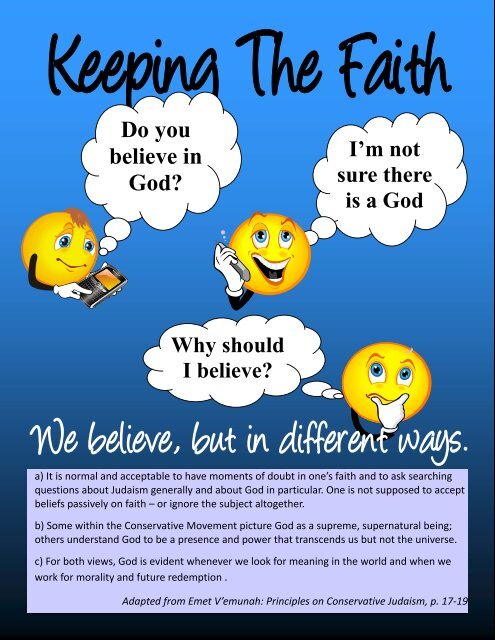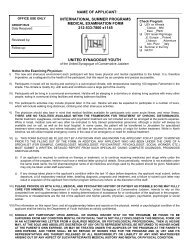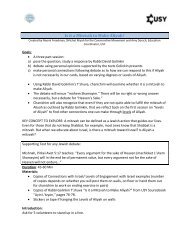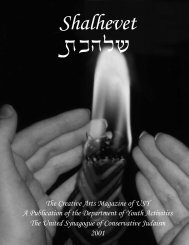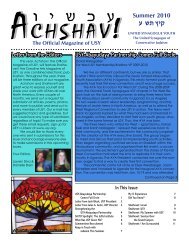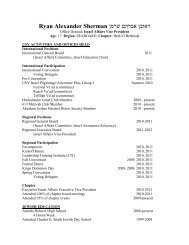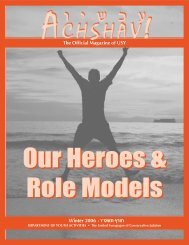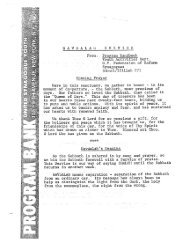Do you believe in God? - United Synagogue Youth
Do you believe in God? - United Synagogue Youth
Do you believe in God? - United Synagogue Youth
- No tags were found...
You also want an ePaper? Increase the reach of your titles
YUMPU automatically turns print PDFs into web optimized ePapers that Google loves.
The atheist star<strong>in</strong>g from his attic w<strong>in</strong>dow is oftennearer to <strong>God</strong> than the <strong>believe</strong>r caught up <strong>in</strong> his ownfalse image of <strong>God</strong>. — Mart<strong>in</strong> BuberIn brief, <strong>God</strong> is the Power <strong>in</strong> the cosmos that gives human life thedirection that enables the human be<strong>in</strong>g to reflect the image of <strong>God</strong>.[<strong>God</strong> <strong>in</strong>spires us to act <strong>in</strong> <strong>God</strong>ly ways.] — Mordechai KaplanWhen two people relate to each other authentically and humanly,<strong>God</strong> is the electricity that surges between them. — Mart<strong>in</strong> BuberTragic and Holy: In try<strong>in</strong>g to understand Jewish existence,a Jewish philosopher must f<strong>in</strong>d agreement with thepeople of S<strong>in</strong>ai as well as with the people of Auschwitz.— Abraham Joshua Heschel<strong>God</strong> is all, and all comes from <strong>God</strong>.Abraham Ibn Ezra, Shmot 23:21You can be a Jew for <strong>God</strong>, aga<strong>in</strong>st <strong>God</strong>, butnot without <strong>God</strong>. — Elie WieselThe creatures of the earth th<strong>in</strong>k of <strong>God</strong> as be<strong>in</strong>gon high. But the heavenly be<strong>in</strong>gs th<strong>in</strong>k of <strong>God</strong> asbelow. This is why they both bless <strong>God</strong> with BaruchKavod Hashem Mimkomo– Blessed is <strong>God</strong>from <strong>God</strong>’s place because no one is sure wherethat is. — Adapted from the Zohar
Even skeptics want to <strong>believe</strong>. We want to <strong>believe</strong> there ismore to life than material existence, so we keep our eyes, earsand most of all, our hearts open. – N<strong>in</strong>a Beth Card<strong>in</strong>, Esa E<strong>in</strong>ai:Visions of Hol<strong>in</strong>ess <strong>in</strong> the EverydayAn exchange between the Hasidic Kotzker Rebbe and his disciples:“Where does <strong>God</strong> exist?” the Rebbe asks of his followers.“Everywhere,” the surprised disciples responded.“No,” the Rebbe answered. “<strong>God</strong> exists only where one lets <strong>God</strong> <strong>in</strong>.”<strong>God</strong>’s existence as it really is, the human m<strong>in</strong>d does notunderstand and is <strong>in</strong>capable of grasp<strong>in</strong>g or <strong>in</strong>vestigat<strong>in</strong>g…– Rambam, Mishneh TorahIn the f<strong>in</strong>al analysis, for the <strong>believe</strong>r, there are no questions, andfor the non‐<strong>believe</strong>r, there are no answers.— Hofetz HayimThere was a joke that speaks of man who was trapped <strong>in</strong> hishouse dur<strong>in</strong>g flood. His neighbors first sent him a raft, then aboat, and f<strong>in</strong>ally a helicopter to lift him away from the ris<strong>in</strong>gwaters. He refused them all say<strong>in</strong>g, <strong>God</strong> will save me. Ultimately,he died <strong>in</strong> the waves of the floodwaters. When he went toheaven, the man stood before <strong>God</strong> and compla<strong>in</strong>ed, “I <strong>believe</strong>d<strong>in</strong> <strong>you</strong> my whole life. I prayed to <strong>you</strong> and was faithful. Whydidn’t <strong>you</strong> save me?” And <strong>God</strong> replied, “I tried. Three times.”One reason (it is) apparent to us is that one’scerta<strong>in</strong>ty with regard to anyth<strong>in</strong>g is poison tohis soul. – Emanuel Rackman
A kaleidoscope of Jewish thoughts on <strong>God</strong>Mordechai Kaplan described <strong>God</strong> as apower for Salvation suggest<strong>in</strong>g we mustmove beyond human depictions of <strong>God</strong>to moments of <strong>God</strong>, or experiences thatmove us. These experiences help us actualizeour potential power. <strong>God</strong> is aforce of nature and cannot commandanyth<strong>in</strong>g. Laws are not commandments,but help us forge an identity.Harold Kushnerdescribed <strong>God</strong> as asource of goodness. Wecan f<strong>in</strong>d <strong>God</strong> <strong>in</strong> order toovercome evil andtragedy and do good.Good deeds are <strong>God</strong>ly.Richard Rub<strong>in</strong>ste<strong>in</strong> wrote about <strong>God</strong> afterthe Holocaust— <strong>God</strong> did not <strong>in</strong>tervene, <strong>God</strong>was silent, rather than the notion that <strong>God</strong>cont<strong>in</strong>uously saves us. <strong>God</strong> is a <strong>God</strong> of nature,but not necessarily benevolent. Ritualand custom is not to celebrate or praise<strong>God</strong>, but to provide support for Jews dur<strong>in</strong>gcrisis and tragedy.Abraham Joshua Heschel looked at <strong>God</strong> as a transcendent<strong>God</strong>, yet with imm<strong>in</strong>ent presence <strong>in</strong> our everyday lives. Weencounter <strong>God</strong> through nature, sacred acts and <strong>God</strong>’s word<strong>in</strong> the Bible. Heschel viewed <strong>God</strong> as a mystery—we encounter<strong>God</strong> through our search, through wonder, awe and faith.<strong>God</strong> helps us expla<strong>in</strong> what we wonder, what “wows” oramazes us. The best path to f<strong>in</strong>d<strong>in</strong>g <strong>God</strong> is through observanceof mitzvot: “A Jew is asked to take a leap of action,rather than a leap of thought.” To Heschel, <strong>God</strong> means actiontogether with belief, not simply believ<strong>in</strong>g alone. Heschel wasless concerned with ways <strong>in</strong> which we try to understand <strong>God</strong>and more with how we respond to <strong>God</strong> <strong>in</strong> the every day.Elliot <strong>Do</strong>rff looks at <strong>God</strong> as the covenantalpartner of the Jewish people —<strong>God</strong> is personal and transcendent, butwe cannot know <strong>God</strong> the way weknow other th<strong>in</strong>gs. Our experienceswith <strong>God</strong> are not only personal, butcommunal as well. <strong>God</strong> is our covenantalpartner <strong>in</strong> a marriage‐like relationship.The nature of this relationshipis b<strong>in</strong>d<strong>in</strong>g, yet flexible.Emanuel Lev<strong>in</strong>as sees <strong>God</strong> as theSource of Morality— similar to theway Buber viewed <strong>God</strong>. We encounter<strong>God</strong> and through this encounter, onebecomes responsible for the other.<strong>God</strong> is the source of moral obligation.Mart<strong>in</strong> Buber classified <strong>God</strong> as a“Partner <strong>in</strong> Dialogue” cit<strong>in</strong>g a highly<strong>in</strong>terpersonal relationship with <strong>God</strong>.Humans have an “I‐Thou” relationshipwith <strong>God</strong>, where both are benefit<strong>in</strong>gand neither is us<strong>in</strong>g the other.We are made <strong>in</strong> <strong>God</strong>’s image, <strong>God</strong> is reflected <strong>in</strong> us. The way <strong>God</strong> behaves, to someextent, is the way we should behave.“Follow the Lord Your <strong>God</strong>” [Dvarim 13:5]. Whatdoes this mean? Is it possible for a mortal to follow<strong>God</strong>’s presence? The verse teaches us thatwe should follow the attributes of the Holy One,Praised is <strong>God</strong>. As <strong>God</strong> clothes the naked, soshould <strong>you</strong>. The Bible teaches us that the HolyOne visited the sick; so <strong>you</strong> should visit the sick.The Holy One comforted those who mourned;so <strong>you</strong> should comfort those who mourn. TheHoly One buried the dead, so <strong>you</strong> should burythe dead.” – Sotah 14a, Babylonian Talmudמאי דכתיב (דברים יג) אחרי ה' אלהיכם תלכו? וכי אפשרלו לאדם להלך אחר שכינה? והלא כבר נאמר (דברים ד) כיה' אלהיך אש אוכלה הוא! אלא להלך אחר מדותיו שלהקב"ה, מה הוא מלביש ערומים, דכתיב (בראשית ג) ויעשה' אלהים לאדם ולאשתו כתנות עור וילבישם, אף אתההלבש ערומים; הקב"ה ביקר חולים, דכתיב (בראשית יח)וירא אליו ה' באלוני ממרא, אף אתה בקר חולים; הקב"הניחם אבלים, דכתיב (בראשית כה) ויהי אחרי מות אברהםויברך אלהים את יצחק בנו, אף אתה נחם אבלים; הקב"הקבר מתים, דכתיב (דברים לד) ויקבר אותו בגיא, אף אתהקבור מתים.<strong>United</strong> <strong>Synagogue</strong> <strong>Youth</strong><strong>United</strong> <strong>Synagogue</strong> of Conservative JudaismPortions of this material were excerpted from Esa E<strong>in</strong>ai: Visions of Hol<strong>in</strong>ess <strong>in</strong> the Everyday,N<strong>in</strong>a Beth Card<strong>in</strong>, New York: <strong>United</strong> <strong>Synagogue</strong> <strong>Youth</strong>, 1997


